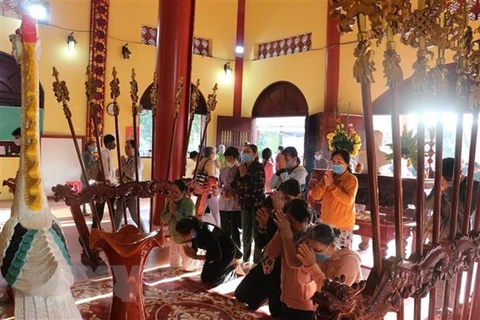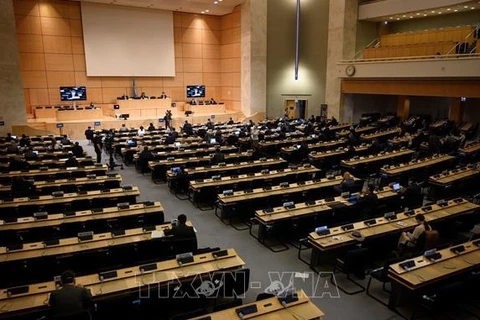Hanoi (VNA) – This year, the Reporters Without Borders (RSF) organisation once again issued biased, unobjective, and completely groundless assessments when listing Vietnam among the countries with little media freedom.
The RSF assessments are far from new but repeat the old mindset from the previous years and show that this organisation has turned a deaf ear to the reality of the protected freedom of speech and the press in Vietnam.
It is a fact that the State of Vietnam has always worked to protect and promote fundamental human rights, including the right to freedom of speech, the press freedom, and the right of access to information, which were regulated in the Constitution and related legal documents and have been practiced in the political, economic, and social aspects in the country.
Ensuring all citizens can practice the right to freedom of speech and of the press under legal regulations is a consistent policy of the Vietnamese Party and State.
Over the past years, the State has made unceasing efforts to complete the legal system so as to facilitate and protect citizens’ fundamental rights relevant to the freedom of speech.
The rules set in the revised Press Law and the Law on Access to Information, both adopted in 2016, completely match international documents on human rights and the right to freedom of speech and of the press.
It is regrettable that the RSF has intentionally ignored the legal documents enforced in Vietnam for many years.
The freedom of speech, freedom of the press, and freedom of information in Vietnam are also clearly reflected in the development of diverse types and content of the press.
In Vietnam, there are now about 41,000 personnel working in the media sector, 779 press agencies, and 72 others licensed to operate in radio - television broadcasting with 87 radio and 193 TV channels.
 Visitors look at exhibits about the Vietnam News Agency at the Vietnam Press Museum in Hanoi (Photo: VNA) Meanwhile, information from major international media agencies like CNN, BBC, TV5, NHK, DW, Australia Network, KBS, and Bloomberg can all be easily accessed in the country.
Visitors look at exhibits about the Vietnam News Agency at the Vietnam Press Museum in Hanoi (Photo: VNA) Meanwhile, information from major international media agencies like CNN, BBC, TV5, NHK, DW, Australia Network, KBS, and Bloomberg can all be easily accessed in the country.
In recent years, activities of press outlets in Vietnam have demonstrated the right to freedom of speech and become an important bridge linking the country with international friends.
Even international media pointed out the “information transparency” factor for many times when reporting on the measures helping Vietnam to contain the COVID-19 outbreaks in 2020. Many foreign newspapers also highly valued the Vietnamese Government’s effective use of social media and information technology for the pandemic fight.
David Hutt, a British journalist covering Southeast Asian politics, also held that when the pandemic broke out, the Party and State of Vietnam were highly transparent and open in sharing and updating data about COVID-19, which is one of the reasons why Vietnamese people put their trust in the anti-pandemic measures taken by the Government.
Besides, the RSF has intentionally turned a blind eye to the fact that Vietnam was recognised as one of the countries with the fastest growth in internet usage, with more than 68 million internet users, or 70 percent of its population.
The internet freedom and the freedom of expression on social networks have always been practiced within the legal framework in order to guarantee cybersecurity and prevent the abuse of social networks to violate Vietnamese law or create a pretext for external forces to intervene in the country.
In Vietnam, no one is brought to trial or arrested just for expressing their opinions or protecting human rights. Only the ones who take advantage of the freedom of speech or of the press to infringe the State’s interests, the rights and legitimate interests of collectives or individuals, and break the law are handled as in line with legal regulations. That matches international law as well as law in many countries.
It is obvious that the guaranteed freedom of speech and of the press in Vietnam is an undeniable reality. The RSF has intentionally negated the Vietnamese Party and State’s efforts in this regard to make wrong and groundless assessments.
Its arguments show that this organisation, with bad intentions, is distorting and twisting the truth about the freedom of the press in Vietnam. The RSF itself is running counter to the journalism principle of respecting and not distorting the truth./.
The RSF assessments are far from new but repeat the old mindset from the previous years and show that this organisation has turned a deaf ear to the reality of the protected freedom of speech and the press in Vietnam.
It is a fact that the State of Vietnam has always worked to protect and promote fundamental human rights, including the right to freedom of speech, the press freedom, and the right of access to information, which were regulated in the Constitution and related legal documents and have been practiced in the political, economic, and social aspects in the country.
Ensuring all citizens can practice the right to freedom of speech and of the press under legal regulations is a consistent policy of the Vietnamese Party and State.
Over the past years, the State has made unceasing efforts to complete the legal system so as to facilitate and protect citizens’ fundamental rights relevant to the freedom of speech.
The rules set in the revised Press Law and the Law on Access to Information, both adopted in 2016, completely match international documents on human rights and the right to freedom of speech and of the press.
It is regrettable that the RSF has intentionally ignored the legal documents enforced in Vietnam for many years.
The freedom of speech, freedom of the press, and freedom of information in Vietnam are also clearly reflected in the development of diverse types and content of the press.
In Vietnam, there are now about 41,000 personnel working in the media sector, 779 press agencies, and 72 others licensed to operate in radio - television broadcasting with 87 radio and 193 TV channels.
 Visitors look at exhibits about the Vietnam News Agency at the Vietnam Press Museum in Hanoi (Photo: VNA)
Visitors look at exhibits about the Vietnam News Agency at the Vietnam Press Museum in Hanoi (Photo: VNA) In recent years, activities of press outlets in Vietnam have demonstrated the right to freedom of speech and become an important bridge linking the country with international friends.
Even international media pointed out the “information transparency” factor for many times when reporting on the measures helping Vietnam to contain the COVID-19 outbreaks in 2020. Many foreign newspapers also highly valued the Vietnamese Government’s effective use of social media and information technology for the pandemic fight.
David Hutt, a British journalist covering Southeast Asian politics, also held that when the pandemic broke out, the Party and State of Vietnam were highly transparent and open in sharing and updating data about COVID-19, which is one of the reasons why Vietnamese people put their trust in the anti-pandemic measures taken by the Government.
Besides, the RSF has intentionally turned a blind eye to the fact that Vietnam was recognised as one of the countries with the fastest growth in internet usage, with more than 68 million internet users, or 70 percent of its population.
The internet freedom and the freedom of expression on social networks have always been practiced within the legal framework in order to guarantee cybersecurity and prevent the abuse of social networks to violate Vietnamese law or create a pretext for external forces to intervene in the country.
In Vietnam, no one is brought to trial or arrested just for expressing their opinions or protecting human rights. Only the ones who take advantage of the freedom of speech or of the press to infringe the State’s interests, the rights and legitimate interests of collectives or individuals, and break the law are handled as in line with legal regulations. That matches international law as well as law in many countries.
It is obvious that the guaranteed freedom of speech and of the press in Vietnam is an undeniable reality. The RSF has intentionally negated the Vietnamese Party and State’s efforts in this regard to make wrong and groundless assessments.
Its arguments show that this organisation, with bad intentions, is distorting and twisting the truth about the freedom of the press in Vietnam. The RSF itself is running counter to the journalism principle of respecting and not distorting the truth./.
VNA

























